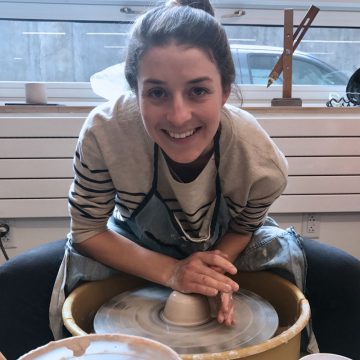“I did feel tempted to go farther away, but I love this area and the people who live here,” says first-year medical student Catherine Gordon. “Why would I leave for the sake of leaving?
“One thing that was important to me when choosing a medical school was a place that highly valued balance—work/life balance and self-care. The students and faculty I met at Geisel have a really good perspective on that.”
Gordon grew up in Norwich, VT, and like most people in the Upper Valley she lives a balanced life: volunteering at local community service organizations, indulging in creative pursuits, and spending a good deal of time outdoors. “I love winter and skiing, so this is a great place to be. And growing up in this community—a place where people truly care about each other—was wonderful. I felt that I was very well looked after,” she says. “It is a community that also emphasizes service, and that had a big influence me as I thought about college and what I wanted to do.”
While a regard for medicine hovered in the background, Gordon pursued her interests in environmental health, policies around climate change, and environmental management at Middlebury College.
After an undergraduate semester abroad spent in West Africa studying health care delivery in Mali, Gordon became interested in global health and health care disparities, but gave no thought to becoming a physician.
Gordon knew she wanted to be involved in furthering health, but didn’t know at what level it would be—population, community, or individual. But the more she explored and learned, she decided going to medical school and becoming a physician would give her the flexibility to affect health on multiple levels—not only to advocate for individual patients, but to also be an advocate for the community in being able to do community-based research that further promotes health.
“I still wasn’t sure which direction I wanted to go,” she says. “As I was trying to figure out my major I discovered there was a lot of overlap between population health, geography, and the availability of resources such as clean water—I felt these weren’t mutually exclusive areas of study, but I had to make a decision.”
She chose population health and environmental health because she thought it would make her a better care provider in one-on-one interactions with patients if she decide on medical school, and would give her a holistic understanding of her patients’ lives in terms of where they lived and the challenges their communities face—people don’t live in vacuums, communities are interconnected systems, she notes.
With public and environmental health under her belt Gordon realized she also needed clinical experience, so she pursued a clinical research job after college in an emergency medicine department in Boston where she rubbed shoulders with a variety of health care providers and talked to patients and their families.
This, coupled with her experience in Mali, convinced Gordon medicine was the right choice for her and she happily returned to the Upper Valley to attend Geisel School of Medicine. “There are so many awesome resources here at Dartmouth—I love it,” Gordon enthusiastically says.
Gordon is an avid crafter and now that she is back in Hanover—she graduated from Hanover High School—she has been indulging her creative impulses, compliments of Dartmouth’s many offerings. An amateur silversmith, she designed and made wedding rings for her father and stepmother; created a wedding guest book, in the book arts studio, for her mother’s upcoming nuptials; and is spending time in Dartmouth’s pottery studio making a variety of small vessels.

“Several of my classmates have been going to the woodshop and I’d like to try that as well. I do enjoy crafts—if I couldn’t be a doctor I’d be a craftsperson,” she confesses. “There are so many things to explore and so little time.”
For some, the heavy workload of a first-year medical student precludes them from participating in a variety of creative pursuits, which on the surface may appear to be a waste of valuable time—something to which Gordon has given some thought. “Often it’s hard to shift from studying to being with friends or doing anything else without thinking about studying or reviewing anatomy terms in your mind, and not being present,” she says. “But for me, creative activity requires focus, which forces you to be present.
“When making pottery you really have to focus on what you are doing and that’s what’s so nice about it—I can’t center a piece of clay while thinking about studying. And the most beneficial thing about that is I’m more energized when I get back to studying. That’s the awesome thing about crafts.”
Considering medicine is as much an art as a science, being focused and present is good training for aspiring physicians. For Gordon, this connection to the arts along with peer support, compassion, and cultural humility is what makes Geisel strong, and it’s something that’s important to her.
“This is why I am happy to be here,” she says. “My classmates and I are all busy, but we are going through this together—I can’t imagine going through medical school without the support of your peers.”